Russia-bashing Blowback: The Birth of the International Russophile Movement (MIR)
Pepe EscobarSubheadline: Archbishop Vigano, Sergei Lavrov, and other luminaries kick off a promising new global grassroots movement which could get very, very big. Russophiles from 40 countries gather in Moscow.
It is my pleasure to present the first comprehensive, detailed report in English, written by an insider, about the International Russophile Movement, launched last month in Moscow.
This project, supported by the Russian Ministry of Foreign Affairs, aims to counterpunch the relentless waves of Russophobia and cancel culture unleashed by the usual suspects since the start of the Special Military Operation (SMO) in Ukraine in February 2022.
As readers will be able to verify, this is a multipolar information project that can become an inspiration for the Global South. The idea is to counteract arrogance and intolerance with an affirmative stance that is deeply rooted in culture, civilizational values and the vision of a more equitable system of international relations.
It’s time to change the narrative. Enjoy the ride (P.E.)
Since the onset of Russia’s military operation in Ukraine in February of last year, globalist elite media have gone into overdrive trying to portray Russia as it exists today, and everything Russian – its government, president, culture, history, religion, as the epitome of evil. Predictably, this is now badly misfiring. Realizing an opening, a prominent Bulgarian public figure is taking his 20 year old Russophile movement global, with applause and encouragement from the Russian government and influential Russian elites. If it gains traction, a very real possibility, Russia, and her many friends and admirers around the world, will have scored a powerful PR victory against globalist elites.

The recently inaugurated International Russophile Movement, which goes by its French acronym, MIR (Mouvement International Russophile), which means ‘peace’ or ‘world’ in Russian, celebrated its founding congress in March in Moscow with a glittering series of well organized public events heavily covered by Russian media, featuring friends and delegates from 42 countries.
The welcome party was a very Russian affair, with spirited toasts, a rich buffet, an excellent Cossack music and dancing troupe, flowing vodka and champagne, and high-spirits all around. Ms. Zakharova, known for her love of Russian folk dancing, did not disappoint, clearly enjoying the opportunity to kick up her heels, a likely welcome diversion from the daily infowars of which she is a popular Russian champion.
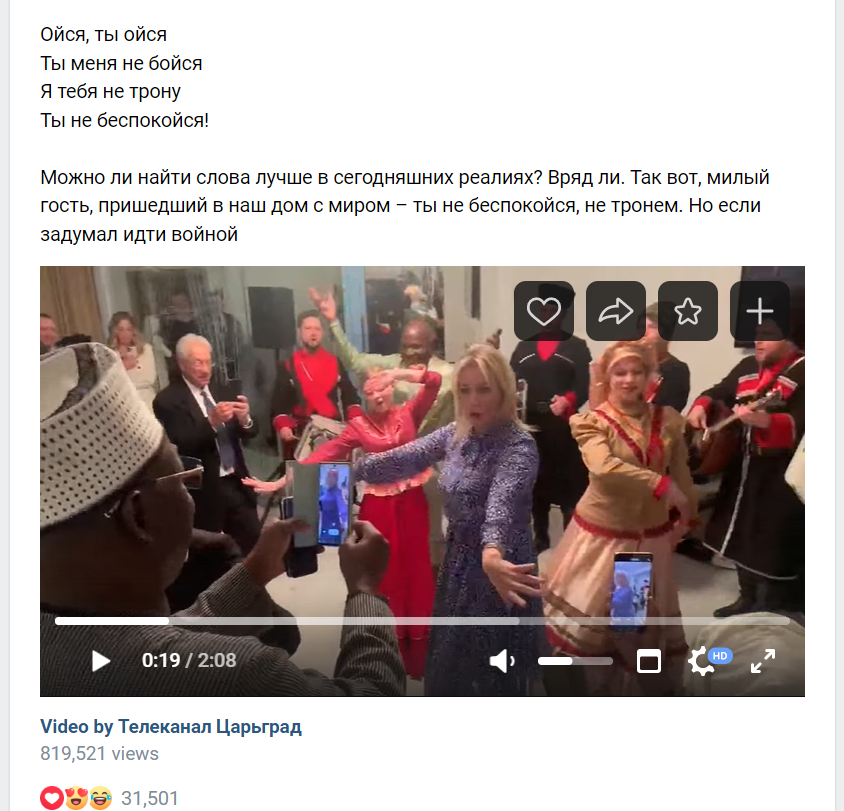
Link to above video. 820,000 views.
On the following day MIR aptly held its founding congress in a large, glassed-in atrium of Russia’s main museum dedicated to its favorite poet, the Russian genius Alexander Pushkin. Russian political heavyweights from across the spectrum welcomed the delegates, starting with foreign minister Sergei Lavrov, Ms. Zakharova again, several heads of Russia’s largest political parties, top members of the government, prominent businessman Konstantin Malofeev, influential political philosopher Alexander Dugin, and a warm welcome from the Head of the Russian Church, Patriarch Kirill, conveyed by Mr. Malofeev.
A very memorable speech in a day of great speeches came from Italian Archbishop Vigano, former Papal Nuncio to the US and outspoken critic of Pope Francis, who gave a 10 minute speech via video link, calling Russia, ‘the last bastion of civilization against barbarism’. For the English text translation, click here. Here is a good review of the speech. Here is the video in Italian.
Russian foreign minister Sergey Lavrov gave the headline speech at the event. He began it by reading a message to the congress from President Putin. You can find the full text here. His remarks included trademark Lavrov repartee:
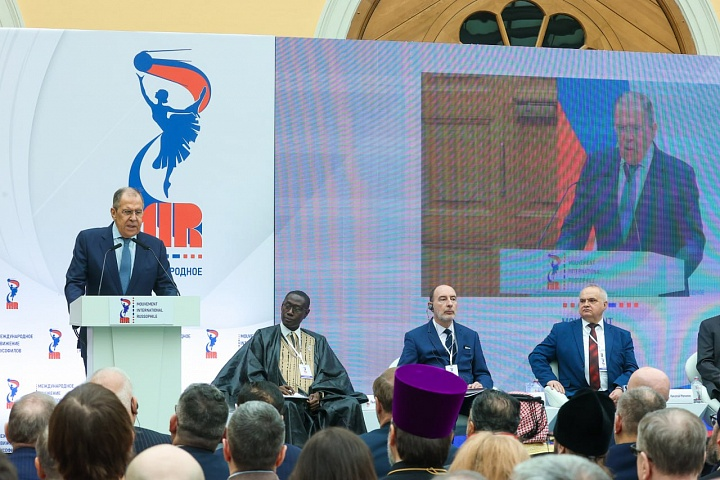
We are all adults here. Let's not try to be condescending, like our Western colleagues are when they publicly demand everyone, including countries representing great ancient civilisations, follow their orders.
Herein lies the difference between us and what the Western civilisation, which is obsessed with its greatness and exceptionality, is degenerating into. It is now fighting for dear life and doing whatever it takes as it tries to cling to its global dominance that is slipping away.
The US (let’s face it, Anglo-Saxons) has taken the reins of power into its own hands and minces no words in telling Europe to forget about strategic autonomy. No strategic autonomy for you! All of you, they are letting them know, will do as we say.
A vast number of Europeans who are steeped in the traditions of the classics of our common vast continent are not willing to give up the achievements of our common culture and history, or the fight for the rights that the people of our planet, including our common vast Eurasian continent, really need.
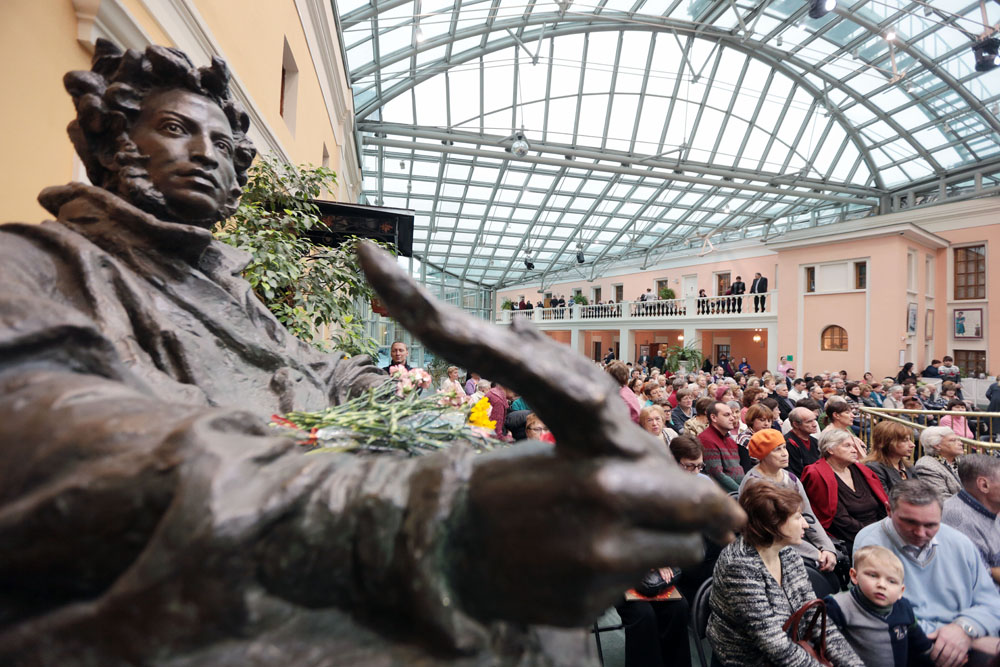
Founding members of MIR also spoke, including the well-known Brazilian journalist Pepe Escobar, businessman Pierre de Gaulle (grandson of the former French president), popular Italian author, academic, and public activist, President of the German Arab Society, Princess Dr. Vittoria Alliata, and German politician and activist Waldemar Herdt (former Bundestag member for the AfD).
Dr. Alliata’s speech, which likened Russophobia to Islamophobia was also very well received, and gives a good idea of the high level of oratory at the event. Rumble video of the speech can be found here. Full English text can be found here, and here is an informative interview (print) with Alliata from a Russian Christian news site (Tsargrad).
After the speeches, delegates formally founded the movement, and elected a governing body.
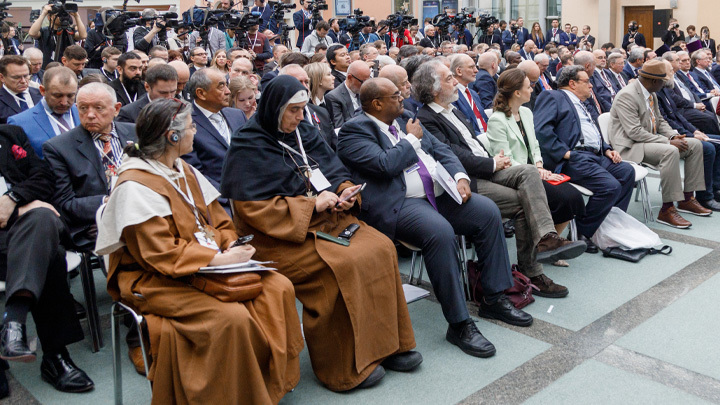
Writing about the event in Zerohedge, Escobar explained why he joined MIR:
I am a founding member and my name is on the charter. In my nearly four decades as a foreign correspondent, I have never been part of any political/cultural movement anywhere in the world; nomad independents are a fierce breed.
But this is extremely serious: the current, irredeemably mediocre self-described “elites” of the collective West want no less than cancel Russia all across the spectrum.
No pasarán.
Here is Escobar's speech:
Here is a link to an interview with Dr. Alliata from RT on the sidelines
Here is a link to a video of the full proceedings (in Russian)
The official Russian Orthodox Church was also strongly represented at the congress, sending four representatives to take part. Here is a link to a Russian TV news report about that (in Russian).
Later that evening, delegates and friends were again wined and dined at the Foreign Ministry’s ‘House of Receptions’, an extraordinary 19th c. gothic revival mansion in central Moscow formerly belonging to one of Tsarist Russia’s richest men, and now used by the ministry for its most lavish social events. Lavrov and Zakharova were again in attendance along with other luminaries, and made themselves available to the guests for hours, often hobnobbing with small groups in a lively exchange of ideas. It was the very opposite of stiff and formal, and a vivid example of official Russia using personal charm and diplomacy in an unusually effective way.
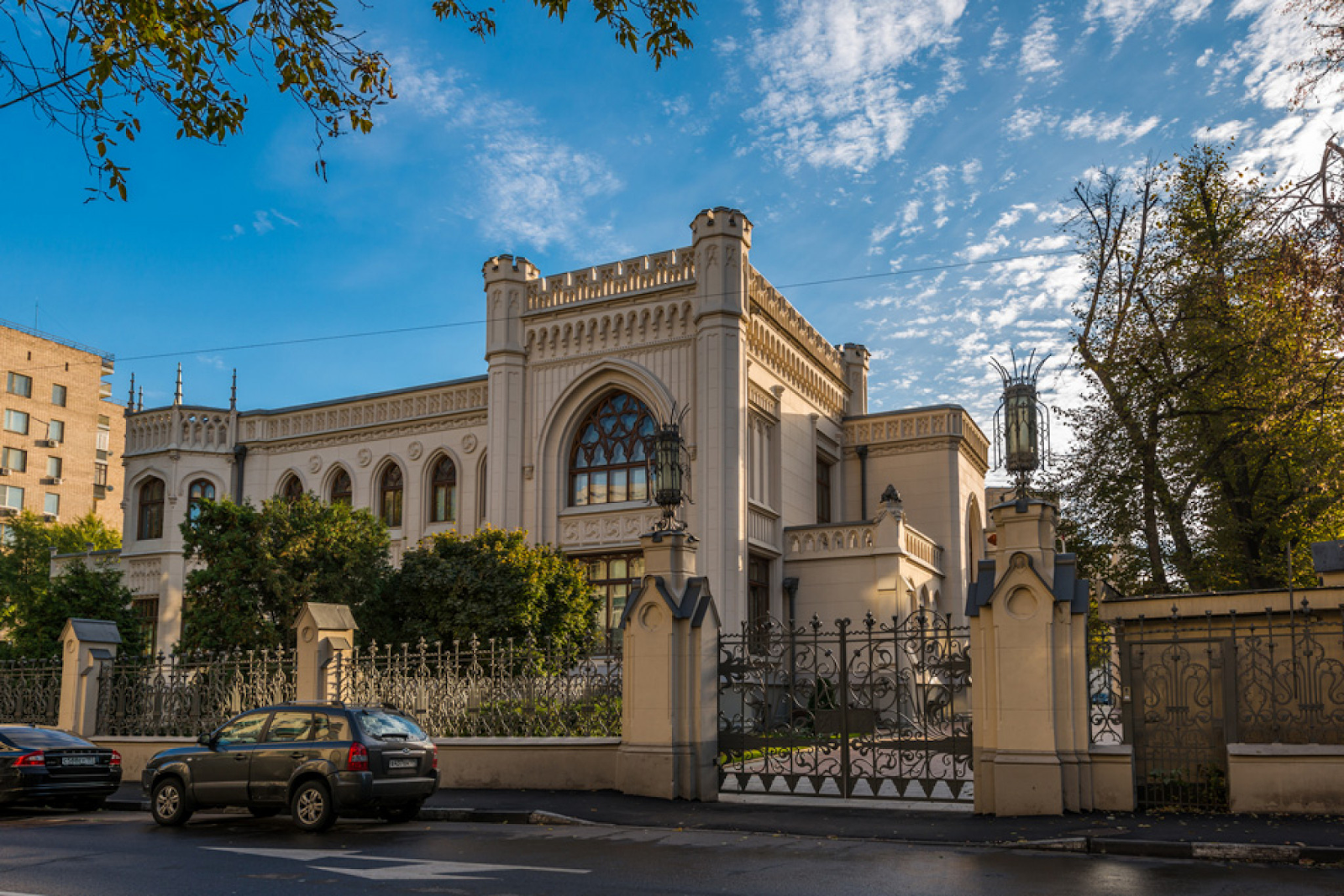
Other prominent names participating in the events include the German journalist and social media sensation, Alina Lipp, Russian activist and businessman Alexey Komov, American actor Steven Seagal, American Orthodox Christian priest Fr. Joseph Gleason, and German alternative journalist Thomas Roeper, who wrote about the event for German audiences.
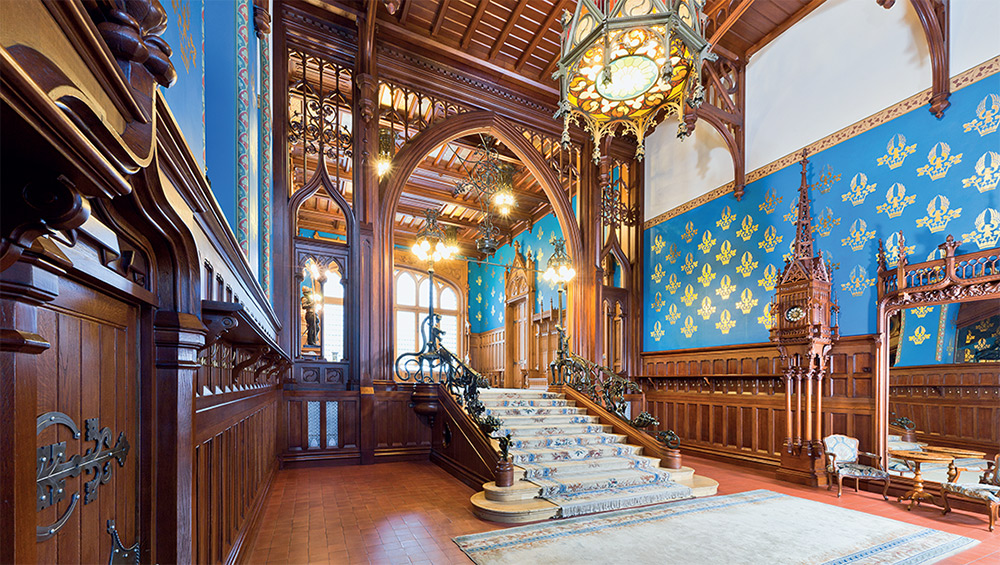
Enthusiasm for MIR goes right to Mr. Putin, who awarded Malinov a rare medal, the ‘Order of Friendship’, in 2019. At the time, Malinov told Putin of his desire to create a global Russophile movement and Putin heartily endorsed the idea.
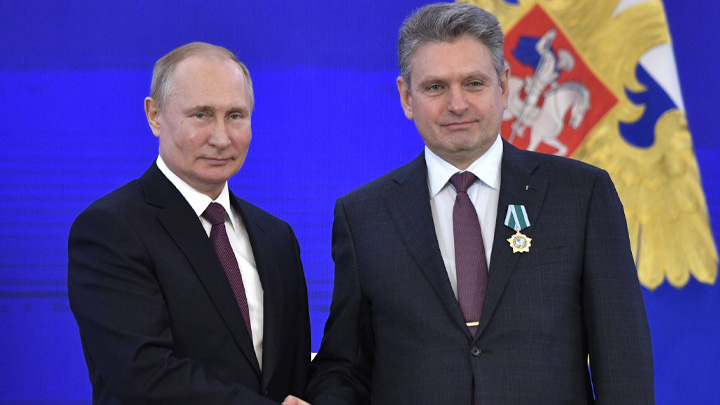
The central question is whether after such a strong launch, MIR actually gets down to business, and does the hard work necessary to deliver on its promise. The enthusiastic send-off by Russia’s establishment is understandable, and in fact, the diplomatic, soft-power, and PR benefits of MIR are obvious. It would be the ultimate upset if, in the face of a massive campaign by globalist media to isolate Russia, millions of people around the world, especially in the US and Western Europe, the home turf of the globalist elite, rejected the demonization, and say that they rather like and admire Russia for a multitude of reasons. This is precisely what MIR is banking on.
Russia, more than most countries, has an enormous, and largely unrealized soft-power resource in the unusual richness and popularity of its cultural, Christian, and historical achievements over the centuries. Its literature, music, ballet, dance, art, sports, and more are legendary and widely loved and admired, and not likely to succumb to a routine globalist demonization campaign. Russia’s emergence as the main defender of traditional Christianity is another compelling front. Decades of championship of sovereignty and anti-colonial movements in the 3rd world have won Russia friends and admirers throughout the global south.
It does appear that MIR is very much the right idea at the right time, coinciding with a striking rise in support and sympathy with Russia in the West, and around the world, over recent months in response to the Ukraine conflict. If at the start of the military intervention 14 months ago Western globalist propaganda reigned supreme, generating strong sympathy for Ukraine, since then Western populations have had time to better understand the conflict, and with the facts widely available on the internet, many people are siding with Russia. In both the US and Western Europe, support for Russia has been growing dramatically, reaching significant levels, such as 30% in the US, putting pressure on the neocon establishment’s ability to further prosecute the war.
Last week, a month since MIR’s founding, we had an opportunity to sit down with Mr. Malinov in Moscow and ask him what progress MIR is making, and what Russophiles around the world can expect going forward. He confirmed that work is moving ahead full-swing, with some rather impressive plans.
Specifically, they are currently building a global website in multiple languages through which members can stay in touch with the movement and learn about latest activities, and allow for people to register and join. They are also planning a series of online events throughout the year, virtual ‘round tables’ on a multitude of subjects related to Russian culture and history. The soonest one, a 24 hour online discussion on multipolarity is scheduled for April 29. It is open to anyone around the world who wants to join. Details on how to do so can be found here.
A physical round table is being planned in Serbia for the end of June, also with online participation. Most importantly, the possibility is being discussed of organizing petitions. One possibility being discussed is running a petition drive in the EU with the goal of gathering 1 million signatures demanding an end to economic sanctions against Russia, which would force, by law, a debate on the subject in the European Parliament. ‘People’s diplomacy’ will be central to MIR, which would involve encouraging tourism to Russia, and making tourist visas a simple and hassle-free procedure. In January of 2024 he wants to have a major event in Moscow, again bringing hundreds of people from all over the world in the name of Russophilia.
Bulgarian roots
Malinov (Wikipedia), 54, a life-long public figure in his native Bulgaria, has been professionally promoting Russophilia for almost his entire political life. He explained that, as in neighboring Serbia, affection for Russia is a powerful political current in Bulgaria, owing to a centuries-long Slavic and Orthodox Christian brotherhood (the Russian and Bulgarian people stem from the same Slavic tribes) between Bulgaria and Russia going back 1500 years.
Bulgaria is the birthplace of the ecclesiastic language, Old Church Slavonic, used in church services, prayers, and Bibles in Russia (in which Russians include Ukraine and Belarus), Bulgaria, and Serbia. Indeed, Bulgaria, like Serbia, recovered its independence from the Ottoman empire thanks to considerable Russian sacrifice and support in the Russo-Turkish wars of …, and Bulgaria, like Serbia, was an important refuge for White Russians fleeing the Bolshevik hellstorm.
Malinov was involved with the founding of the Bulgarian Russophile movement in 2003, and it has been a large part of his life since then, and indeed, it is a significant force in Bulgarian domestic politics.
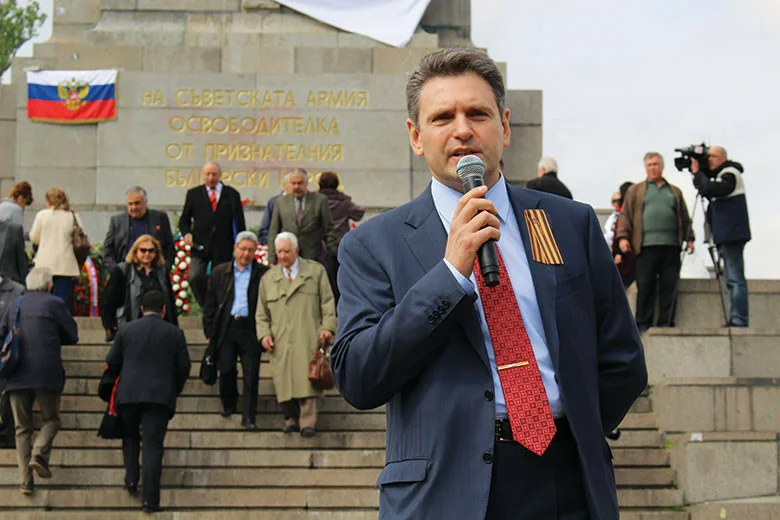
Malinov says he has been thinking about building a global Russophile movement for years, and that the decision to start was made in September of last year, when he discussed it with Russian foreign minister Sergei Lavrov when they attended an unveiling of a statue to St. Alexander Nevsky (+1263), one of Russia’s greatest and most popular military and religious heroes, at the ministry of foreign affairs in Moscow.
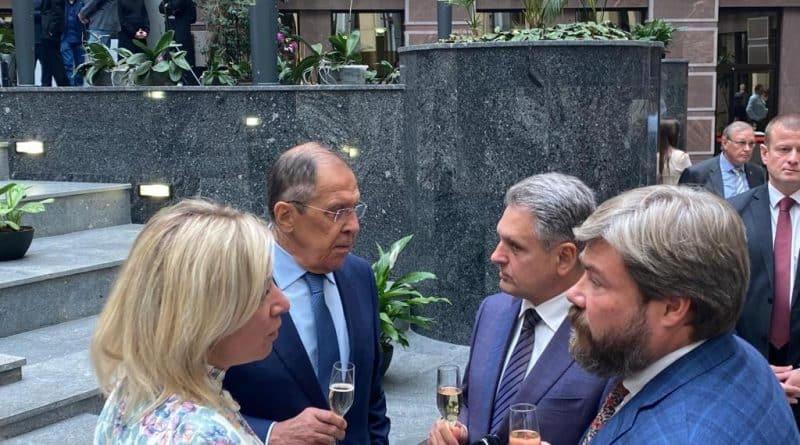
He began actively lobbying Russian political leadership to get behind a global Russophile movement starting in 2018, at the Livadia Forum, an annual conference held by the Federation Council, the Russian equivalent of the US Senate, at the famous royal palace of the same name in Crimea, a favorite of the last Tsar and his family, who have since been canonized. The annual event was started after Crimea voted to become part of Russia with the goal of gathering friends of Russia from around the world.
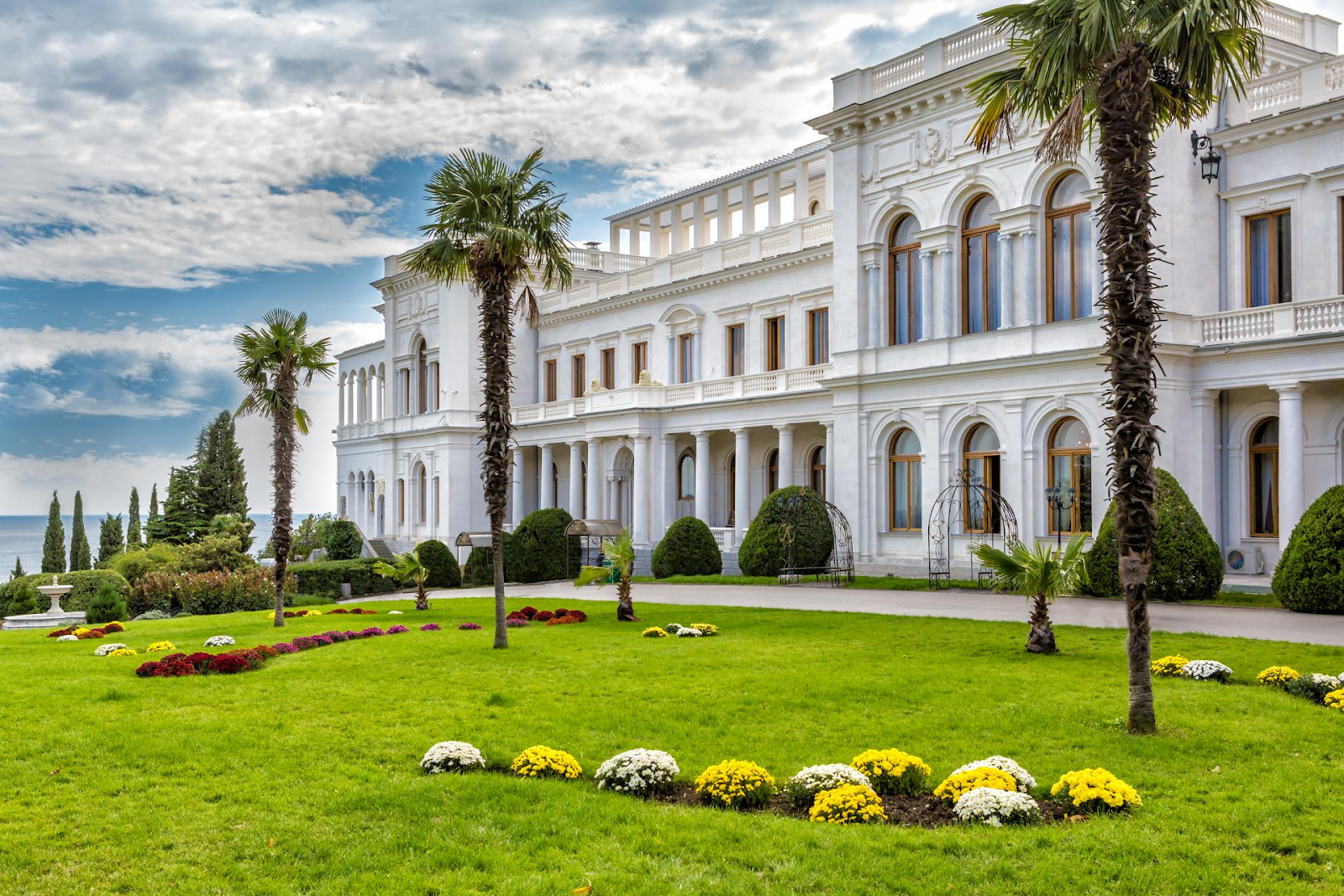
Malinov’s Bulgarian organization “Russophiles’ has chapters throughout Bulgaria, and has organized public, open-air events where attendance reached 40,000 people. Here is a link to their website, and a Wikipedia article about them. Their activities include maintaining public monuments to Russian-Bulgarian friendship, identifying important historical dates around which to organize public events, roundtables and concerts, publishing books, articles, TV segments and films, and educating people about Russia, including working with schools and kindergartens.
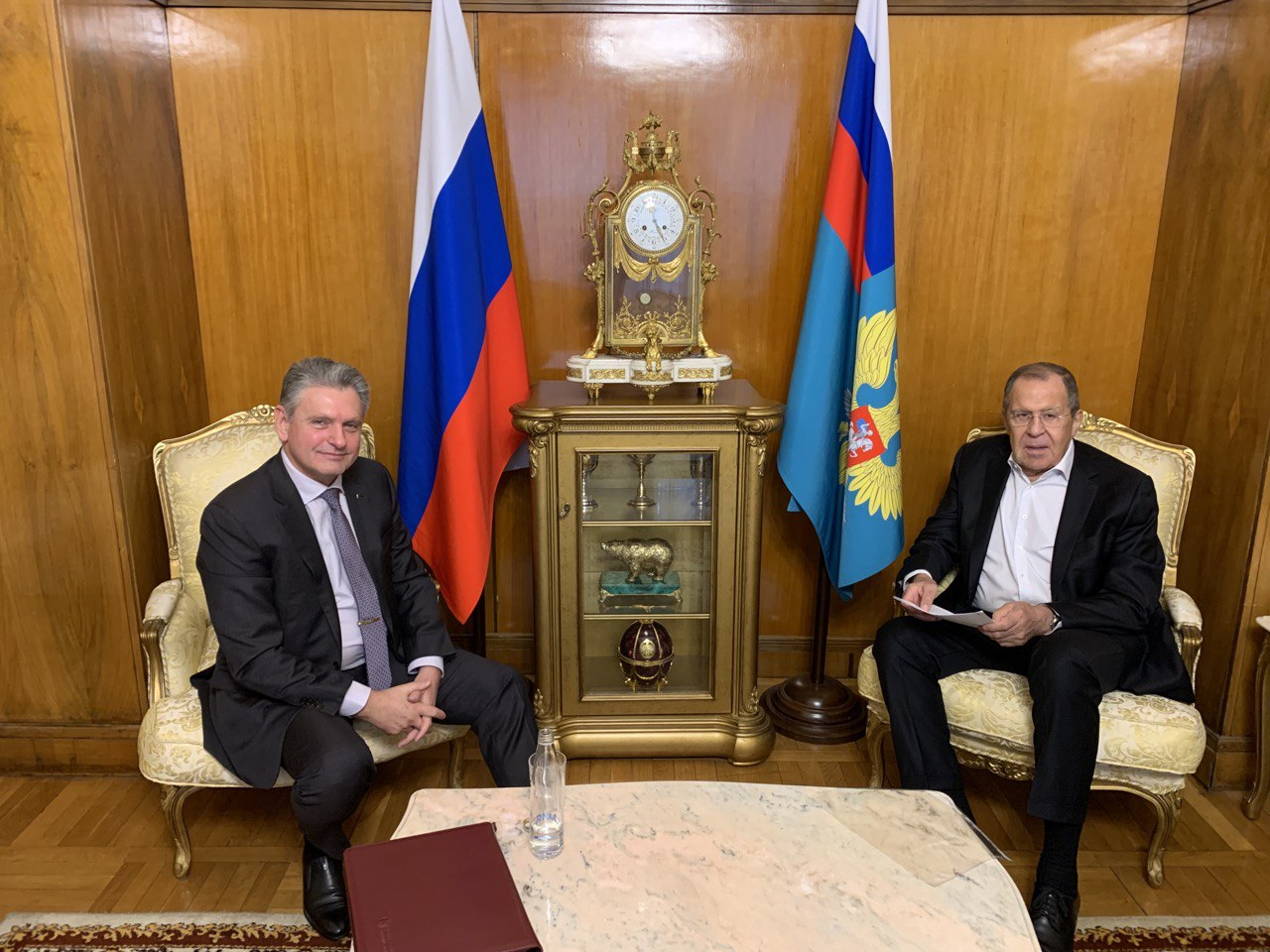
Malinov has spent his entire career in Bulgarian party politics, mostly with the Bulgarian Socialist Party (BSP), a social-democratic successor to the Bulgarian Communist Party, focusing on media and publishing. He was the successful publisher of the BSP’s newspaper, ‘Duma’, ‘New Times’, which is the oldest social-democratic magazine in the world, the magazine ‘Contemporary Indicator’, and the Bulgarian editions of ‘The Russian Gazette’ (the official organ of the Russian government), and ‘Le Monde Diplomatique’ a venerable leftist, anti-globalist French monthly, majority-owned by ‘Le Monde’, a major French daily newspaper. Malinov has also been a representative in the Bulgarian parliament for the BSP. He broke with the BSP in 2015 because he disagreed with its increasingly pro-US position regarding Russia.
Asked about his political views, Malinov insists that the left-right paradigm is outmoded, and exists only to control and manipulate people. He is overtly Christian, with a gold Orthodox cross lapel pin, and liberally peppers his speeches and conversation with Christian references. In his introductory speech at the congress, Malinov explained that his understanding of Russophilia is the embrace of truth and decency, exemplified by Russia, and deceit and evil, as exemplified by what he calls a ‘neo-liberal dictatorship’ in power in the West.
Malinov stressed that he believes the populations of the West are oppressed by a malignant elite, and one should not lump together the people of the West and their governments. ‘Don’t confuse people and governments’ says Malinov. He says he stressed this when he met Putin in 2019, and that Putin agreed with him, repeatedly advancing this theme in subsequent speeches.‘
The main thing I want to get across in this interview are these 3 simple ideas, which embody the idea of Russophilia’ emphasized Malinov, ‘Traditional Values - Strong National States - A Multipolar World.’ He elaborates, ‘being a Russophile means being a patriot of your own country, because Russia stands for multipolarity.’ Malinov explained that these simple ideas work with all world religions and political systems, and that after much thought, he distilled the principles of his organization to these three points, precisely because they can be embraced around the world.
Listening to Malinov and his public statements, it becomes clear that he is sincerely, Christian, and that his lapel pin is not for show. His conversation is peppered with references to his faith. ‘It's a spiritual battle’, he declares, saying that he will run MIR on the principles of ‘humility, honesty, and transparency’.
Despite the complete neutrality of MIR regarding religions, one could not help noticing a Christian tinge to the atmosphere. Founding members Malinov, Herdt, and Sorlin are very conservative Christians. Konstantin Malofeev and Alexander Dugin are too, and additionally, strong Orthodox Christian monarchists. Here is a recent speech by Dugin at the World Russian People’s Council where is Christian worldview is clearly stated. The Russian Orthodox Church sent 4 representatives, and the main Christian TV channel covered the event. Another delegate is a Palestinian Orthodox priest. (Name?)
Malinov’s university degree is in history, and his discussion of the roots of Russian-Bulgarian friendship reveals a sophisticated understanding of European history, political philosophy, and Christian Orthodox theology. Indeed, Malinov comes across as a man immersed in journalism, media, and ideas.
He dwells on the idea that Russia is the ideal vessel to bring about peace and understanding around the world because it is part of both East and West. He argues that countries like Russia and Bulgaria have had to learn to get along with sometimes hostile neighbors over centuries, and that the Eastern European, Christian Orthodox mentality is more ‘delicate and nuanced’, more focused on cooperation and consensus than the more categorical and divisive West.
Asked about the burgeoning movement among Russian elites to open up Russia to immigration from the West, particularly for people of Russian (Russians understand this to includes Ukrainian and Belarus) ethnicity, Malinov says that he is aware of the phenomenon and endorses it, but that this will not be a major focus of MIR. Significantly, MIR Vice Chairman,the German politician Waldemar Herdt, is very active in this movement, so one might expect some overlap.
Getting back to organizational details, he stresses that he is rolling out MIR slowly but surely. He says he has been deluged with enthusiasm since the very public founding last month, mostly from people who want to know how they can participate and get involved. He warns about over-expectations, while reassuring that everything is on track will take its place in good time. Specifically, he said he expects that a final decision on MIR’s activities and program for the coming year will be made in early May.
Malinov says that despite a lot of interest, membership in MIR will not be open to Russian citizens. ‘Russian citizens are already Russophiles, or at least they ought to be’, he quips. ‘We want this to be a place where people from other countries register their affection and admiration of Russia.’
MIR elected a governing body at the founding congress in Moscow, which includes, among others:
Chairman - Nikolai Malinov - Bulgaria
Vice-chairmen:
- Waldemar Gerdt - politician (former AfD) and social activist - Germany
- Fabrice Sorlin - businessman and social activist - France
- Elie Hatem - lawyer and political advisor - Lebanon
- Souleymane Anta Ndiaye - diplomat - Senegal
Members:
- Jan Czarnogurski former prime minister - Slovakia
- Princess Dr. Vittoria Alliata - Author and social activist - Italy. Wikipedia. YouTube.
- Ivan Kostić - politician - Serbia
- Pepe Escobar - journalist - Brazil
- Guy Mettan - journalist and politician - Switzerland
- Mariusz Schwider journalist - Poland
- Samir El Ghadban Christian activist - Syria
- Patrick Poppel - activist and journalist - Austria
- Mikis Filaniotis - literary translator - Cyprus
- Omurbek Egemberdiyev - public figure - Kyrgyzstan
- Pardamean Laurentius Raymond Junior - singer - Indonesia
- Steven Segal actor - USA
- Sammy Kotwani businessman - India
- Sherif Ged social activist - Egypt
- Yunoussou Doukansi political activist - Mali
- Alexandre Djourbavia - Albania
Countries represented at the founding congress, among others, include:
- Albania
- Argentina
- Austria
- Armenia
- Belarus
- Brazil
- Bulgaria
- Cyprus
- Czech Republic
- Egypt
- France
- Georgia
- Germany
- Hungary
- India
- Indonesia
- Israel
- Italy
- Kyrgyzstan
- Lebanon
- Latvia
- Lithuania
- Mali
- Moldova
- Montenegro
- Poland
- Romania
- Senegal
- Serbia
- Slovakia
- South Africa
- Spain
- Sudan
- Syria
- Switzerland
- Transnistria
- Turkey
- USA
- Venezuela
Major countries not represented include Japan, China, Australia and Canada, among others. Malinov believes that within a short time most countries in the world will be represented in his organization.
A Russian print news outlet did an excellent write-up of the congress which gives a good sense of the atmosphere and thinking:
“The chosen emblem of the new movement is also indicative - a ballerina throwing a satellite into the air and wrapped in the colors of the Russian flag. This choice of symbol was intended to emphasize that it is about uniting people around a culture.
This was also emphasized by the guests of the congress - the poet and diplomat from Senegal Suleiman Anta Ndiay and the passionate Sicilian princess Vittoria Alliata di Villafranca, the cosmopolitan leftist geopolitician from Brazil Pepe Escobar and the former prime minister of Slovakia Jan Czarnogursky, and Italian Prelate Carlo Maria Vigano, who sees in Russia the last bulwark of salvation in a world that is inexorably slipping into Satanism, transhumanism and degeneration.
Further Reading:




Geen opmerkingen:
Een reactie posten